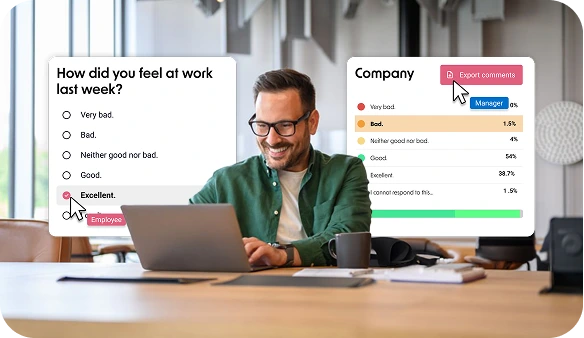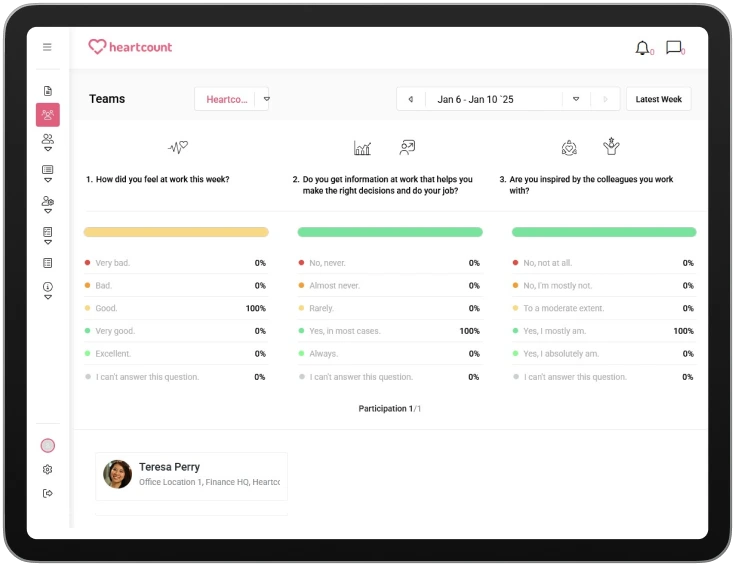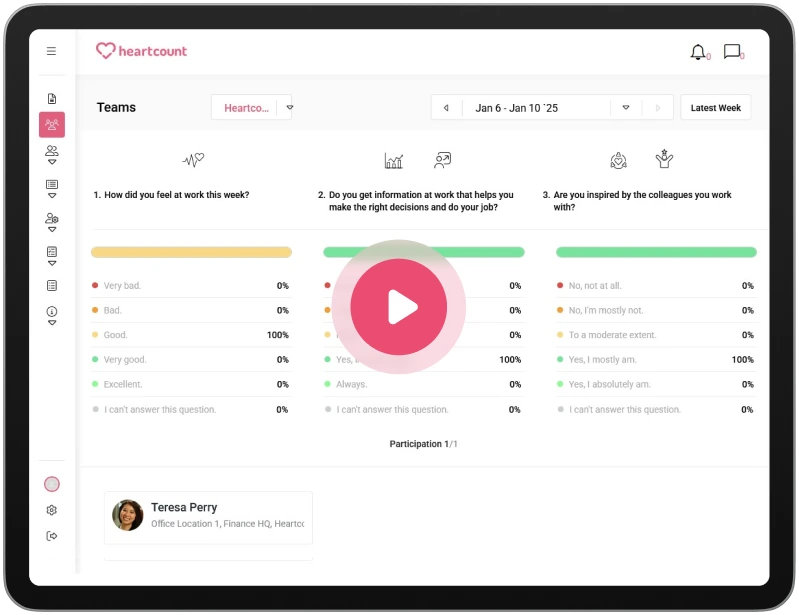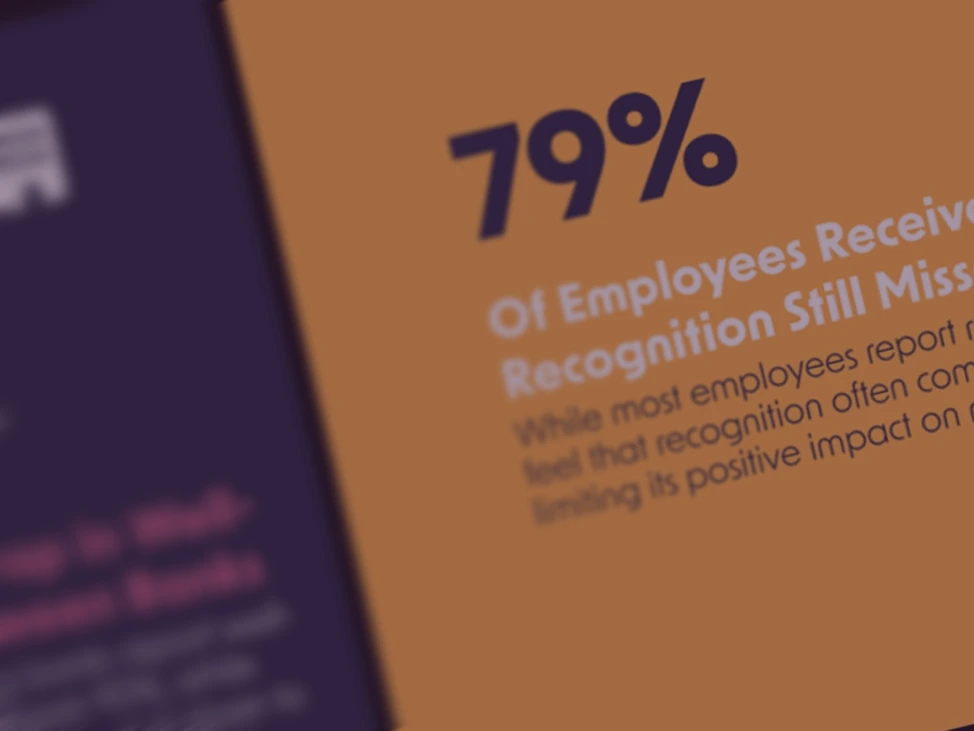Exit Interviews for HR: Best Practices, Questions & Strategic Benefits (2025)

Most companies treat exit interviews like a formality. But when designed right, they’re one of HR’s most powerful tools for diagnosing culture gaps, improving retention, and closing feedback loops.
As organisations face rising resignation rates and lingering disengagement, especially across hybrid and distributed teams, understanding why employees leave has become mission-critical. Yet many employers still overlook structured offboarding as a strategic opportunity. In fact, McKinsey research shows that more than 40% of employees who left jobs during the Great Resignation cited uncaring leaders and lack of career development as key reasons, issues exit interviews can help surface and address early.
This guide breaks down how to turn exit interviews into a strategic advantage in 2025. You’ll learn:
- How to frame exit interviews for honesty and impact
- What questions to ask across different feedback categories
- How to apply the insights in real time to reduce preventable turnover
We’ll also show how continuous feedback tools like HeartCount can help HR teams go beyond offboarding and build a culture of listening across the full employee lifecycle.
-
1.What Is an Exit Interview?
-
2.The Importance of Exit Interviews
-
3.Exit Interview Best Practices
-
4.Exit Interview Formats: Pros and Cons
-
5.20 Exit Interview Questions to Ask (With Categories)
-
6.Using HR Tools to Automate and Improve Exit Interviews
-
7.FAQs About Exit Interviews
-
8.Final Thoughts: Build a Culture of Feedback from Start to Finish
Most companies treat exit interviews like a formality. But when designed right, they’re one of HR’s most powerful tools for diagnosing culture gaps, improving retention, and closing feedback loops.
As organisations face rising resignation rates and lingering disengagement, especially across hybrid and distributed teams, understanding why employees leave has become mission-critical. Yet many employers still overlook structured offboarding as a strategic opportunity. In fact, McKinsey research shows that more than 40% of employees who left jobs during the Great Resignation cited uncaring leaders and lack of career development as key reasons, issues exit interviews can help surface and address early.
This guide breaks down how to turn exit interviews into a strategic advantage in 2025. You’ll learn:
- How to frame exit interviews for honesty and impact
- What questions to ask across different feedback categories
- How to apply the insights in real time to reduce preventable turnover
We’ll also show how continuous feedback tools like HeartCount can help HR teams go beyond offboarding and build a culture of listening across the full employee lifecycle.
What Is an Exit Interview?
Exit interviews are structured conversations conducted at the end of an employee’s time with a company. Typically led by HR or a neutral party, they aim to gather insights about the employee’s experience, reasons for departure, and suggestions for improvement.
Unlike performance reviews or engagement surveys, exit interviews happen at a pivotal transition point, when the employee is leaving and more likely to speak freely. This makes them uniquely valuable for surfacing honest feedback that might not be shared during employment. When paired with proactive practices like stay interviews, they form a powerful feedback loop that helps HR teams act before top talent decides to leave.
What Is the Purpose of an Exit Interview?
The core purpose of an exit interview is to learn from departures in order to improve the experience of those who stay. These conversations give HR teams insight into workplace dynamics, leadership, and cultural alignment, all of which directly influence employee engagement and retention.
Exit interviews also offer a moment of reflection for the departing employee. When handled thoughtfully, they can leave a positive final impression and support a more respectful offboarding experience.
Why Do HR Managers Conduct Exit Interviews?
HR professionals conduct exit interviews to uncover patterns that standard surveys might miss. While one resignation might seem isolated, a series of similar comments can signal deeper issues with management, workload, communication, or culture.
HR managers also use exit interviews to:
- Inform leadership development
- Refine onboarding or training processes
- Strengthen employee retention strategies
- Provide data to shape future HR initiatives
By capturing feedback at this final touchpoint, HR leaders can close the loop and prevent repeated mistakes.
Are Exit Interviews Mandatory or Optional?
Exit interviews are optional in nearly every country and industry. They are not legally required, and employees are free to decline. That said, most organisations strongly encourage participation, especially when feedback is anonymised and clearly explained.
Companies that make exit interviews feel like a check-the-box exercise tend to see lower participation and less useful data. In contrast, those that explain the intent and value behind the process often get better results and higher engagement.
Are Exit Interviews Confidential?
While exit interviews are not anonymous, they should be treated as confidential. This means that responses are recorded and analysed with care, and individual feedback is not attributed to specific people in internal reports.
Creating a safe space is essential. As discussed in HeartCount’s guide on anonymous vs. confidential surveys, psychological safety begins with clarity. Be upfront about who will see the data, how it will be used, and how employees are protected.
Is an Exit Interview Legal?
Yes, exit interviews are entirely legal. They are a standard HR practice across industries and are not subject to regulation in most regions. However, organisations must ensure that interviewers do not pressure employees, violate privacy, or record discriminatory remarks without action.
For global companies, it’s also important to respect local labour laws and data protection standards when storing or analysing feedback from exiting employees.
The Importance of Exit Interviews
Exit interviews are more than just a final checkpoint before someone leaves the company. They offer strategic value when positioned correctly within the broader employee experience. By using this feedback to improve culture, manager effectiveness, and organisational alignment, HR teams can drive real change across the business.
Benefits for HR and Organizational Strategy
When exit interviews are done well, they offer unique insights that are difficult to capture elsewhere. For HR leaders, these interviews can help:
- Identify recurring reasons for attrition
- Spot team-specific issues that may not appear in engagement data
- Improve hiring, onboarding, and career development practices
- Understand how leadership behaviour impacts morale
- Reveal blind spots in communication, recognition, or workload balance
Because they reflect employees’ unfiltered experiences, exit interviews can challenge assumptions and validate what pulse or engagement data is already indicating.
You can learn more about aligning exit feedback with your wider talent approach in HeartCount’s article on employee retention strategies.
Common Drawbacks and Challenges
Despite their value, exit interviews also come with limitations. Common issues include:
- Employees withholding honest feedback out of fear
- HR teams collecting data but failing to act on it
- Inconsistent processes that make analysis difficult
- Interviews being rushed or treated as an afterthought
- Lack of cross-referencing with other data sources
Without psychological safety and a clear follow-up plan, exit interviews risk becoming symbolic rather than strategic.
Are Exit Interviews Worth It?
When paired with consistent follow-up, exit interviews absolutely are worth the effort. They’re one of the few moments where employees feel free to say what they really think, without fear of consequences. But the value only emerges when their insights are reviewed, discussed, and turned into action.
For example, an employee might share that their decision to leave was influenced by poor team communication. On its own, that data point may feel anecdotal. But when three other team members flag similar concerns in pulse surveys, it signals a clear pattern.
This is why HR teams benefit from combining exit feedback with real-time engagement data. HeartCount explores this further in its guide on how to reduce employee turnover.
How Exit Interviews Drive Business and Culture Strategy
Strategically, exit interviews help organisations:
- Reinforce a culture of listening
- Benchmark manager performance across teams
- Fine-tune internal communications and recognition
- Align EVP (employee value proposition) with actual experience
- Improve decision-making with both qualitative and quantitative input
They are also part of a broader feedback ecosystem. When you gather data across the entire employee lifecycle, from onboarding to exit, you can identify the moments that matter most. This makes it easier to build a workplace culture that retains top performers and supports long-term growth.
COLLECT
Exit Interview Best Practices
The way you conduct exit interviews matters as much as the questions you ask. A rushed or poorly handled conversation can lead to surface-level answers or, worse, damage trust with departing employees. To gather meaningful insights and preserve your employer brand, HR teams need a structured, thoughtful approach.
How to Encourage Honesty
The most valuable exit interviews come from candid conversations. To foster honesty:
- Set the tone early: Let the employee know their input is valued and will be used to improve the experience of others
- Explain confidentiality: Clarify who will see their feedback and how it will be shared
- Avoid defensiveness: Stay neutral, listen actively, and avoid justifying company decisions during the interview
- Use a consistent format: Familiarity builds comfort, especially when feedback is expected
When employees believe their words won’t be used against them, they’re far more likely to speak openly.
Who Should Conduct the Interview?
Exit interviews should not be conducted by the employee’s direct manager. Instead, they’re best led by:
- A neutral HR team member
- An internal people operations specialist
- An external consultant (for senior or sensitive roles)
The goal is to reduce emotional baggage or conflict of interest so the employee feels free to speak honestly.
When and Where to Schedule It
Timing and setting make a big difference. The ideal window is between the resignation notice and the employee’s final week, giving time for emotions to settle, but not too late to lose relevance.
Choose a setting that’s:
- Private
- Distraction-free
- Comfortable (either in-person or remote)
For remote teams, a video call with cameras on tends to be more effective than phone or text-based exchanges.
Should You Use a Standardized Questionnaire?
Yes, but with flexibility. A core set of standardised questions ensures you can analyse data across roles and departments. This helps you spot patterns and act on common feedback themes.
However, interviews should never feel scripted. Always leave space for follow-ups, clarifications, or comments the employee wants to share unprompted. A well-balanced structure combines consistency with curiosity.
What Not to Say in an Exit Interview (as HR)
HR professionals should approach exit interviews as observers and facilitators, not defenders of company policy. Avoid phrases that may shut down open dialogue, such as:
- “That’s not true.”
- “We’ve never had that problem before.”
- “I’ll be sure to tell your manager.”
- “This won’t change anything, but thanks anyway.”
- “You’re just frustrated.”
Instead, focus on listening, validating the employee’s experience, and thanking them for sharing it. Your goal isn’t to change their mind. It’s to learn from their perspective.
Exit Interview Formats: Pros and Cons
There’s no one-size-fits-all approach to exit interviews. The best format depends on your organisation’s size, culture, and the nature of the role. That said, each format comes with clear trade-offs in terms of depth, consistency, and effort required.
Online Exit Surveys
| Pros | Cons |
|---|---|
| Scalable and efficient for large organisations | Limited depth of insight |
| Easy to standardise and track | Cannot probe further on vague answers |
| Lower pressure for employees uncomfortable with interviews | Lower participation if not positioned well |
If you’re using platforms like HeartCount, automated employee pulse check surveys can be extended to offboarding workflows, ensuring feedback loops don’t end at resignation.
Email-Based Exit Interviews
| Pros | Cons |
|---|---|
| Flexible for remote/asynchronous teams | Easy to ignore or delay |
| Less intrusive than live interviews | No opportunity for follow-up |
| Allows time for thoughtful responses | Lacks emotional nuance and tone |
This format can work well for contractors, interns, or employees who’ve already left but are willing to provide feedback.
Phone or Video Calls
| Pros | Cons |
|---|---|
| Enables real-time dialogue and probing | Can feel impersonal without video |
| More flexible for distributed teams | Requires scheduling time |
| Provides richer qualitative insights | Some employees may hold back in live formats |
This is often the best middle ground for remote-first companies seeking both insight and efficiency.
In-Person Interviews
| Pros | Cons |
|---|---|
| Most engaging and personal | Logistically harder to arrange |
| Body language and tone offer more context | Not feasible for remote setups |
| Builds rapport and trust | Can feel formal or confrontational if mishandled |
In-person interviews work best for senior roles or long-tenure employees whose insights may offer broader strategic value.
20 Exit Interview Questions to Ask (With Categories)
A strong exit interview balances consistency with open-ended dialogue. The questions should explore what led to the departure, what the employee experienced during their time, and what can be improved for future hires.
Here are 20 tried-and-tested questions, grouped by category to help HR teams build their own standardised templates.
1. Questions About Reasons for Leaving
These help uncover the real drivers behind the resignation—not just surface-level answers.
- What motivated your decision to leave?
- Was there a specific turning point that led to your resignation?
- Did you explore internal opportunities before deciding to leave?
- What could have been done earlier to encourage you to stay?
- Were there any unmet expectations from your role or team?
2. Questions About the Employee Experience
These questions reflect on the day-to-day work environment, culture, communication, and support.
- How would you describe the company culture?
- Did you feel recognised and valued for your contributions?
- How often did you receive meaningful feedback or support?
- Were resources and tools sufficient for you to succeed?
- Did you feel comfortable speaking up when something wasn’t working?
Many employees point to poor communication, lack of autonomy, or micromanagement as key drivers of dissatisfaction, all of which can surface during exit interviews. These themes are explored in depth in HeartCount’s article on how micromanagement stifles creativity and growth.
3. Role-Specific and Manager Feedback Questions
These questions help assess leadership, clarity, and workload—core elements that influence retention.
- How clear were your responsibilities and goals?
- Did your manager provide the support you needed?
- What worked well in your team, and what didn’t?
- How would you rate communication and collaboration across departments?
- Were there any blockers that consistently affected your performance?
This category also aligns closely with employee recognition and how it’s experienced within teams.
4. Forward-Looking and Company Improvement Questions
Encouraging feedback about what could be better helps the company improve its future talent experience.
- Would you recommend this company to others? Why or why not?
- What advice would you give someone joining your role?
- What one thing should we improve to retain top performers?
- How did your experience here compare to your expectations when you joined?
- Is there anything you’d like to share that we haven’t covered?
These closing questions often reveal powerful insights when trust and safety have been established earlier in the interview.
UNDERSTAND
Using HR Tools to Automate and Improve Exit Interviews
Exit interviews provide the most value when they are part of a broader system, not just a one-time conversation. HR teams can improve the consistency, reliability, and strategic impact of exit data by using the right tools to collect, analyse, and act on feedback.
Custom Survey Templates with HeartCount
Standardised templates help HR teams compare feedback across departments, roles, and time periods. But building those templates from scratch can be time-consuming.
HeartCount offers custom employee surveys that allow you to design exit interview frameworks tailored to your organisation’s values and tone. Templates can include scaled questions, open-ended responses, and dynamic prompts based on employee sentiment.
These surveys are particularly effective for distributed teams or organisations with frequent transitions, helping you maintain a consistent offboarding experience across the board.
Analyzing Data and Spotting Trends
Collecting exit feedback is only useful if you can translate it into insight. This is where analytics become essential.
Using HeartCount’s employee overview and data-driven insights, HR teams can identify patterns across exit interviews, weekly pulse surveys, and engagement snapshots. These tools make it easier to:
- Detect recurring themes by team or manager
- Understand how reasons for leaving change over time
- Connect exit insights to engagement or burnout indicators
- Prioritise specific improvements based on employee feedback
When feedback is easy to interpret, it becomes much easier to act quickly and effectively.
Closing the Loop: Acting on Feedback
One of the most common failures in offboarding is gathering feedback that never leads to change. Employees are more likely to share honest input when they know it will be used constructively, and future employees benefit when exit data informs better practices.
HeartCount supports this process through pulse survey tools and structured feedback loops that help HR teams respond to what they learn. This could involve:
- Improving onboarding processes based on exit feedback
- Coaching managers on themes identified in offboarding data
- Expanding internal career paths when lack of growth is cited
- Communicating changes back to the team to show follow-through
When exit feedback is integrated into a broader strategy of listening and action, it becomes a powerful tool for cultural growth and retention.
FAQs About Exit Interviews
How Long Should an Exit Interview Be?
Usually between 30 and 60 minutes. It should be long enough to cover key questions without overwhelming the employee.
What If an Employee Refuses to Participate?
Participation is voluntary. HR should respect the decision and offer alternative formats like a survey if needed.
Can Exit Interviews Prevent Turnover?
Not directly, but they help identify patterns that lead to smarter retention strategies.
How to Make Exit Interviews More Effective for the Business
Use consistent questions, analyse feedback regularly, and act on what you learn to improve the employee experience.
Should You Always Use the Same Questions?
A core set of questions helps with tracking trends, but it’s useful to adapt based on the employee’s role and feedback.
How Should Employees Prepare for an Exit Interview?
They should reflect on their experience and be ready to share honest, constructive feedback in a respectful setting.
ACT
Final Thoughts: Build a Culture of Feedback from Start to Finish
Exit interviews are not just about saying goodbye. They are a valuable opportunity to learn, improve, and strengthen your workplace for the people who remain. When approached with intention, they help uncover the patterns behind turnover, highlight gaps in culture, and inform better decisions across the organisation.
But the most effective HR strategies do not wait until someone resigns. Exit interviews should be part of a larger culture of continuous feedback that begins on day one and carries through the entire employee journey. Listening often, acting consistently, and closing the loop with transparency is what builds trust.
The best time to fix a problem is before someone leaves. Exit interviews help you understand why they did.











